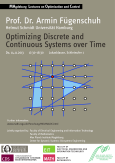Vortrag Prof. Armin Fügenschuh

Optimizing Discrete and Continuous Systems over Time
Prof. Armin Fügenschuh
Helmut Schmidt Universität Hamburg
Time & Place
The presentation on November 14, 2013 will be given in the Lukas Klause (Schleinufer 1, 39104 Magdeburg) and starts at 5.30 p.m.
Abstract
The first part of my talk is a joint work with G. Nemhauser and Y. Zeng (Georgia Tech). The scheduling and routing of small planes for fly-in safaris is a challenging planning problem. Given a set of flight requests with bounds on the earliest departure and latest arrival times, the planes must be scheduled and routed so that all demands and capacity restrictions on load and fuel are satisfied. Moreover the refueling of the planes, which can only be done in certain locations, must be scheduled. We present a formulation where the time windows are relaxed, and later reintroduced by branching. Numerical results on real-world instances show the computational merits of our approach.
The second part of my talk is a joint work with I. Vierhaus (Zuse Institute Berlin) on the optimization of System Dynamics (SD) models. The SD methodology, invented by Jay Forrester, is a framework for modeling and simulating the dynamic behavior of socioeconomic systems. Characteristic for the description of such systems is the occurrence of feedback loops together with stocks and flows. The mathematical equations that describe the system are usually nonlinear. Therefore seemingly simple systems can show a nonintuitive, nonpredictable behavior over time. Controlling a dynamical system means to define a desired final state in which the system should be, and to specify potential interventions from outside that should keep the system on the right track. The central question is how to compute such globally optimal control for a given SD model. We propose a branch-and-bound approach that is based on a bound propagation method, primal heuristics, and spatial branching. We apply our new SD-control method to some test problems from the literature.




